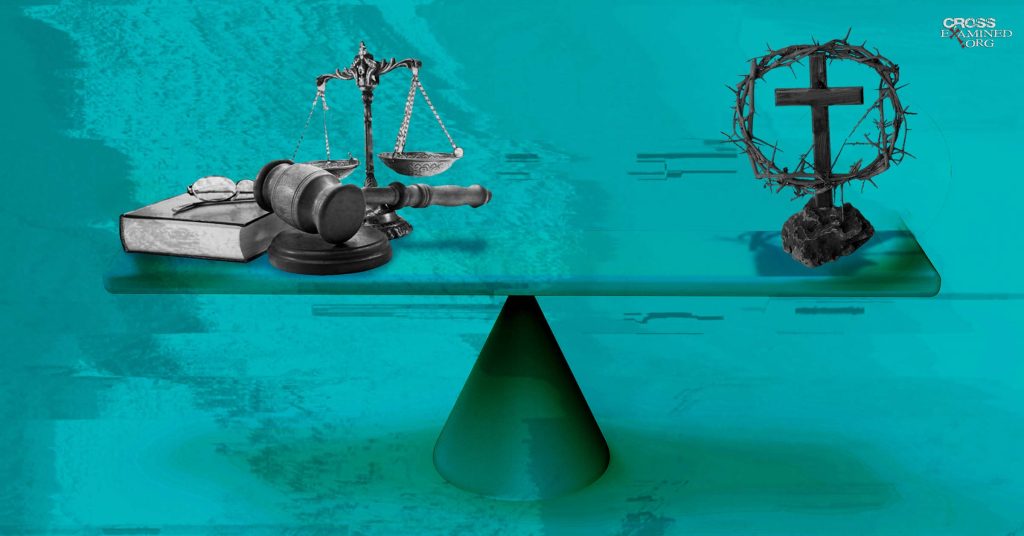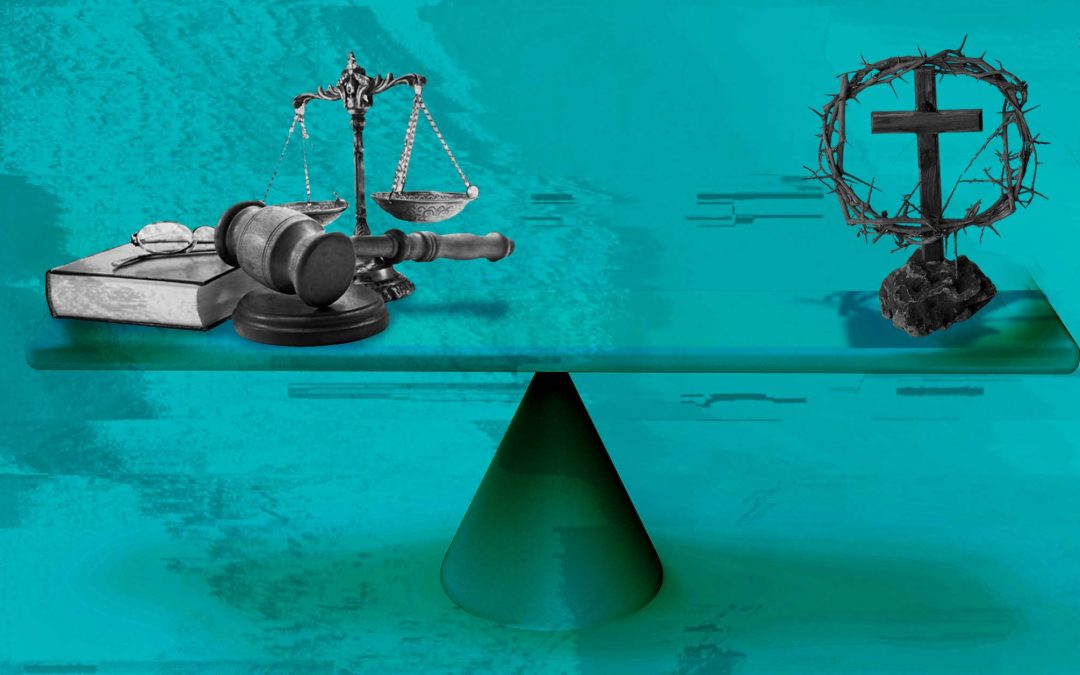Perhaps you, like me, have had the experience of being stopped by a police officer for a traffic offense such as speeding. I recall well the feeling of burning anger that the officer would dare to stop me, of all people, for barely going 17 miles per hour faster than the posted speed limit. How dare this officer not realize what a great person I am, not to mention how rotten everyone else is!

As he politely wrote me a ticket and told me that I needed to slow down, it was hard not to tell him to go find a real criminal and waste their time, instead of a good and handsome young man such as myself. Needless to say, I was naive to think I was sinless, and the handsome part was probably a stretch too. I was young, though.
Not too much later in life, I found myself in a police officer’s uniform, driving a police car, and stopping cars for doing the very same thing I did on that fateful day when I got a ticket. It wasn’t that my opinion of police in general was low, only police that would believe that I was doing something wrong.
While I immediately enjoyed the job, which included plenty of adventure and opportunities to see the world as it really is, I couldn’t help but feel guilty of hypocrisy when I stopped cars. On top of that, the State of Illinois instituted mandatory seatbelt laws when I was a very young officer. I had never, never worn a seatbelt unless I was on a roller coaster. Now I was supposed to enforce a law I didn’t obey. How could I do such a thing?
And then I handled a few crashes. Then, I handled some crashes with injuries and some crashes resulting in death. I handled more than a few crashes that ended in senseless deaths that were completely avoidable with seatbelts, and often with the combination of speed or other recklessness. It made me understand why we conduct enforcement of traffic laws. It made me understand why laws about speed and seatbelts exist; to save people from crashing, from injuries and from death itself.
When the theory became reality my understanding of law enforcement changed. I found that traffic laws, and all the other laws I swore to enforce, were eventually rooted in protecting people. No matter the law, if you traced it to its source, they all originated in protecting people.
For example, stores are good. When you need stuff you can go there and buy stuff. However, if there is nothing to stop people from stealing stuff from the store, or from robbing the owners of the stuff, how could an owner ever hope to establish a profit. You wouldn’t be able to provide stuff to people.
Without the stores, things get bad pretty quick. Jobs are lost. Deliveries of stuff from other places stop. We are back to foraging for our stuff, which is a pretty tricky thing in 2022. But with laws for retail theft and robbery in place, there is a negative consequence to stealing and robbing. Stores are able to provide stuff to people who need it thanks to the criminal laws that give us a mechanism to dissuade most people from stealing from, or robbing the stores.
As I became better acquainted with the relationship between laws and the relationship to protecting people, I found that my ability to interact with law breakers changed for the better. For example, when stopping a car for speeding or a seatbelt violation after some experiences with traffic crashes ending in serious injuries or death I could quickly explain to drivers not just what law they broke, but I could explain why the law existed in the first place. I could say that I had seen the crashes and injuries and death that come about when people are not obeying laws.
There was a particular street in my city where I would run radar that was a major foot traffic and crossing point for school children and people with disabilities. When I explained to angry or irritated drivers that we have people who aren’t as mentally or physically able to adjust to speeding cars, almost every driver I explained those issues to had a completely different reaction to the stop. Full disclosure, I almost never write tickets. I am a softy. But if I could explain the rationale of the law that led me to the traffic stop, people typically left the encounter less annoyed, and with at least the knowledge that this street is one they should slow down for. It didn’t always work, but I was always willing to write it down for people who had trouble understanding.
Looking back, and with the perspective of my Christian contemplation and study, I realize now that the laws of society need love and love needs the law. If we make traffic laws simply for the purpose of revenue generation by police, no citizen will be pleased. We should expect outrage over the way that these laws would negatively impact the very people who pay taxes for the enforcement of those laws. If there is no clear way that the law benefits society at the individual or corporate level, it is just a disguised tax.
On the other hand, if we just hope everyone drives safely, and we have no laws and no consequences to ensure it, what motive would anyone have to drive safely, other than self -preservation? And the problem with self-preservation and traffic laws is that roads are used for multiple vehicles at one time. You may be the safest driver ever, but if Lenny Leadfoot is late for work and texting about how drunk he is as he eats a burrito in a construction zone, it won’t help you at the four-way intersection that he doesn’t see. And beyond the initial tragedy, there is no redress of grievances for those crashed into by unsafe drivers.
The law without love is simply an instrument of oppression. Love without the law may feel good for a while, but eventually a whole lot of people get hurt.
As we look at how Jesus interacted with the Pharisees, who were the legal scholars of the day, it seems clear He believed they were bound for hell, and leading others to hell. I only say that because He literally said that in Matthew 23:13. (ESV) In fact, the entire chapter is one “Woe to you” after another. The Pharisees were experts at what the law was, but were apparently not experts at why the law was. And I say that with fear and trembling, as I continue to discover the love in laws, especially Biblical laws.
As far as love without the law, in His Sermon on the Mount, Jesus made it clear that He did not come to abolish the law:
17 “Do not think that I have come to abolish the Law or the Prophets; I have not come to abolish them but to fulfill them. 18 For truly, I say to you, until heaven and earth pass away, not an iota, not a dot, will pass from the Law until all is accomplished. 19 Therefore whoever relaxes one of the least of these commandments and teaches others to do the same will be called least in the kingdom of heaven, but whoever does them and teaches them will be called great in the kingdom of heaven. 20 For I tell you, unless your righteousness exceeds that of the scribes and Pharisees, you will never enter the kingdom of heaven. (Matt 5:17-20 ESV)
It seems to me that, like the laws of science, the laws for man from God were devised to ensure his survival and his ability to thrive. Like the laws of physics and mass conspire to keep us from floating into space, or being squashed to the ground, good laws exist to protect man and allow for his survival and ability to thrive.
There must be some type of order because without order, disorder brings about only carnage and death. If I give you permission to do whatever you like to whoever you like because I say I love you, how does that work out for those you may choose to hurt? And if I say I love you so much that I allow you to injure yourself because you hate yourself, am I not agreeing with your inclination to hate yourself? This seems unloving to me.
The law, like gravity, seems inescapable. Love is not a certainty, but if laws are rooted in love, they will provide man the ability to survive and thrive. It seems to me the ministry of Christ was not to change the laws, but rather to bring the law and love back into balance. In dying for sin, on the cross, in our place, Jesus showed that the law must be accomplished, and yet He allowed our escape from the ultimate penalty of the law. We who recognize His motives no longer have the law as a master, but as a way to survive and thrive, not to mention glorify the One who created Heaven and Earth, and cares enough about us to provide a law, and a love that goes beyond our understanding.
Recommended resources related to the topic:
Counter Culture Christian: Is the Bible True? by Frank Turek (Mp3), (Mp4), and (DVD)
When Reason Isn’t the Reason for Unbelief by Dr. Frank Turek DVD and Mp4
_____________________________________________________________________________________________________________________________________________________
Tony Williams is currently serving in his 20th year as a police officer in a city in Southern Illinois. He has been studying apologetics in his spare time for two decades, since a crisis of faith led him to the discovery of vast and ever-increasing evidence for his faith. Tony received a bachelor’s degree in University Studies from Southern Illinois University in 2019. His career in law enforcement has provided valuable insight into the concepts of truth, evidence, confession, testimony, cultural competency, morality, and most of all, the compelling need for Christ in the lives of the lost. Tony plans to pursue postgraduate studies in apologetics in the near future to sharpen his understanding of the various facets of Christian apologetics
Original blog: https://bit.ly/3ScMRC5


















Facebook Comments